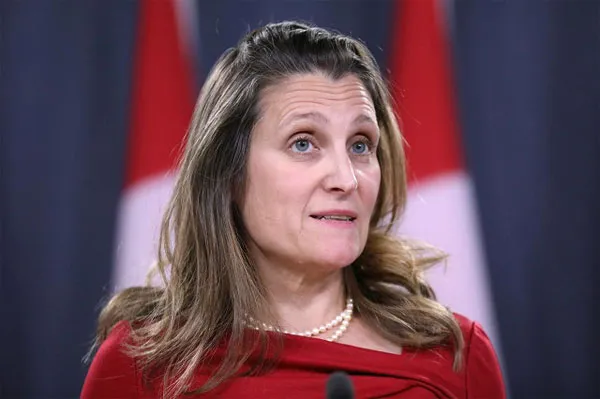Hôm 12/12, Bộ trưởng Ngoại giao Canada Chrystia Freeland đã đưa ra lời cảnh báo Mỹ không nên chính trị hóa việc dẫn độ Giám đốc tài chính tập đoàn Huawei là bà Mạnh Vãn Chu, một ngày sau khi Tổng thống Mỹ Donald Trump lên tiếng tỏ ý định muốn can thiệp vào vụ việc lãnh đạo thuộc tập đoàn Huawei bị bắt giữ tại Canada theo yêu cầu từ phía Mỹ.

Bộ trưởng Ngoại giao Canada Chrystia Freeland. Ảnh: Reuters
Song song đó, nhà chức trách Trung Quốc cho biết đã bắt giữ cựu quan chức ngoại giao Micheal Kovrig của Canada hôm 10/12.
Phía Trung Quốc đã phản đối mạnh mẽ về hành động bắt giữ Giám đốc tài chính của tập đoàn công nghệ Huawei Mạnh Vãn Chu hôm 1/12. Bà Mạnh bị buộc tội đã đánh lừa các ngân hàng đa quốc gia về các giao dịch liên quan đến Iran, khiến cho các ngân hàng này có nguy cơ vi phạm vào các lệnh trừng phạt mà Mỹ dành cho Iran. Mạnh Vãn Chu đã lên tiếng bác bỏ cáo buộc, nói rằng bà vô tội.
Tổng thống Trump hôm 11/12 cho Reuters biết ông có thể sẽ can thiệp vào vụ cáo buộc này nếu nó phục vụ cho lợi ích an ninh quốc gia hay giúp cho việc chấm dứt tiến trình đàm phán thương mại với Trung Quốc.
Bà Freeland nói quy trình pháp lý không nên để mục đích chính trị xen vào.
Một số câu hỏi khác được đặt ra liệu rằng ông Trump có thực hiện sai yêu cầu dẫn độ?
Bà Mạnh Vãn Chu vừa được cho tại ngoại sau phiên tòa ngày 11/12.
Hiện phía Mỹ vẫn chưa đưa ra một kiến nghị dẫn độ chính thức. Một khi có bản kiến nghị này và luật pháp Canada có điều luật phù hợp với kiến nghị, Bộ Tư pháp Canada sẽ quyết định có dẫn độ bà Mạnh sang Mỹ hay không.
Bộ trưởng Ngoại giao Freeland cũng bày tỏ lo ngại sâu sắc đối với việc công dân Canada Kovrig bị bắt giữ và cho biết một công dân Canada khác đã liên lạc với chính quyền nước này nói nhà chức trách Trung Quốc đang thẩm vấn người này. Canada sau đó đã mất liên lạc với người này.
Nhà chức trách cũng không thấy chứng cứ từ phía Trung Quốc cho thấy vụ bắt giữ Kovrig có liên quan đến lệnh bắt giữ bà Mạnh.
Một làn sóng chống đối Canada đã xuất hiện trên mạng xã hội và tại Trung Quốc khiến chính quyền Canada bắt đầu lo ngại cho sự an toàn của nhân viên ngoại giao nước này tại Trung Quốc.
Canada warns U.S. not to politicize extradition cases
(Reuters) - Canadian Foreign Minister Chrystia Freeland on Wednesday warned the United States not to politicize extradition cases, a day after President Donald Trump said he could intervene in the affair of a Chinese executive detained in Canada at Washington's request.
Freeland also told reporters that a second Canadian citizen could be in trouble in China. Authorities in China are already holding former diplomat Michael Kovrig, who was detained on Monday.
China has strongly protested the arrest in Vancouver on Dec. 1 of Huawei Technologies Co Ltd Chief Financial Officer Meng Wanzhou. Meng has been accused by U.S. prosecutors of misleading multinational banks about Iran-linked transactions, putting the banks at risk of violating U.S. sanctions. She has said she is innocent.
Trump told Reuters on Tuesday he would intervene in the U.S. Justice Department's case against Meng if it would serve national security interests or help close a trade deal with China.
But the legal process should not be hijacked for political purposes, Freeland said.
"Our extradition partners should not seek to politicize the extradition process or use it for ends other than the pursuit of justice and following the rule of law," Freeland said when asked about Trump's comments.
Others also questioned whether Trump might be misusing the extradition request.
"This is a legal issue and one that appears properly executed but your comments can only diminish an important extradition agreement we have with our next door neighbor," said Bruce Heyman, an ex-U.S. ambassador to Canada who was appointed by President Barack Obama, Trump's predecessor.
Meng was released on bail by a Canadian court on Tuesday.
The United States has not yet made a formal extradition petition. Once it does, if a Canadian judge rules in favor of the request, Canada's justice minister must decide whether to extradite Meng to the United States.
Freeland expressed deep concern over the Kovrig case and said a second unnamed Canadian had made contact with Canadian authorities to say Chinese officials were asking him questions. Canada has not been able to make contact with him since, she added.
Officials said earlier they have no indication from Beijing that Kovrig's detention was tied to Canada's arrest of Meng.
But they have seen an uptick in anti-Canadian sentiment online and in China, an official said, and have communicated concerns about diplomatic staff safety to the Chinese government, which beefed up security in response.
"We have in general informed our personnel in Beijing and in our consulates to take extra precautions," an official said.


